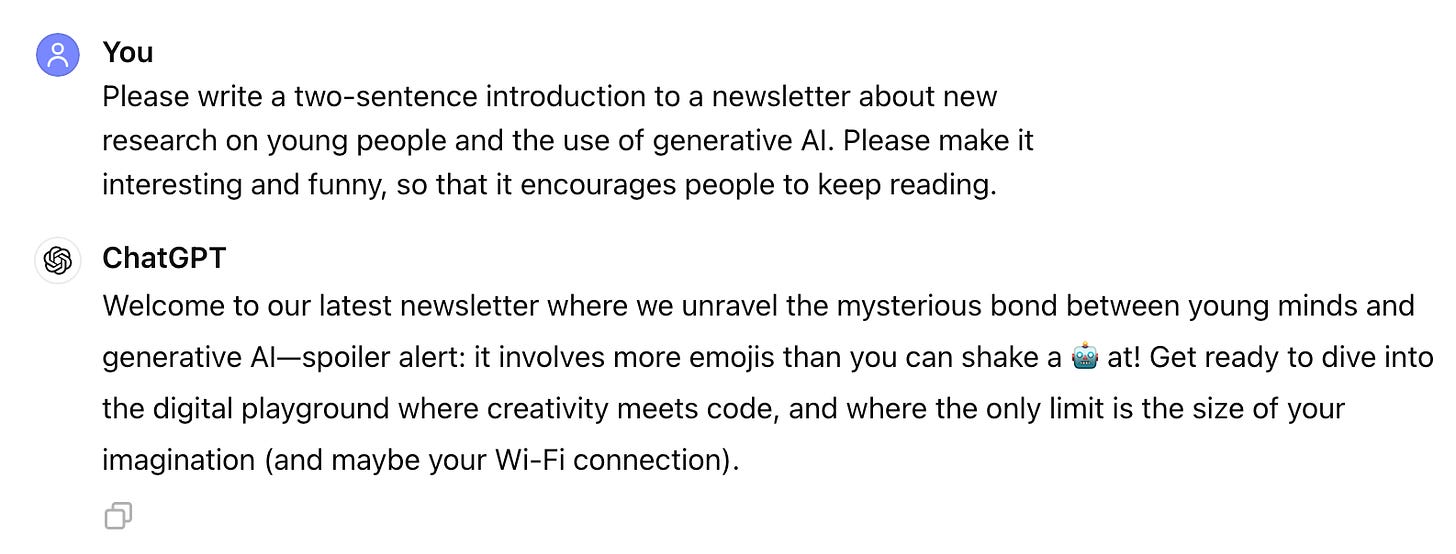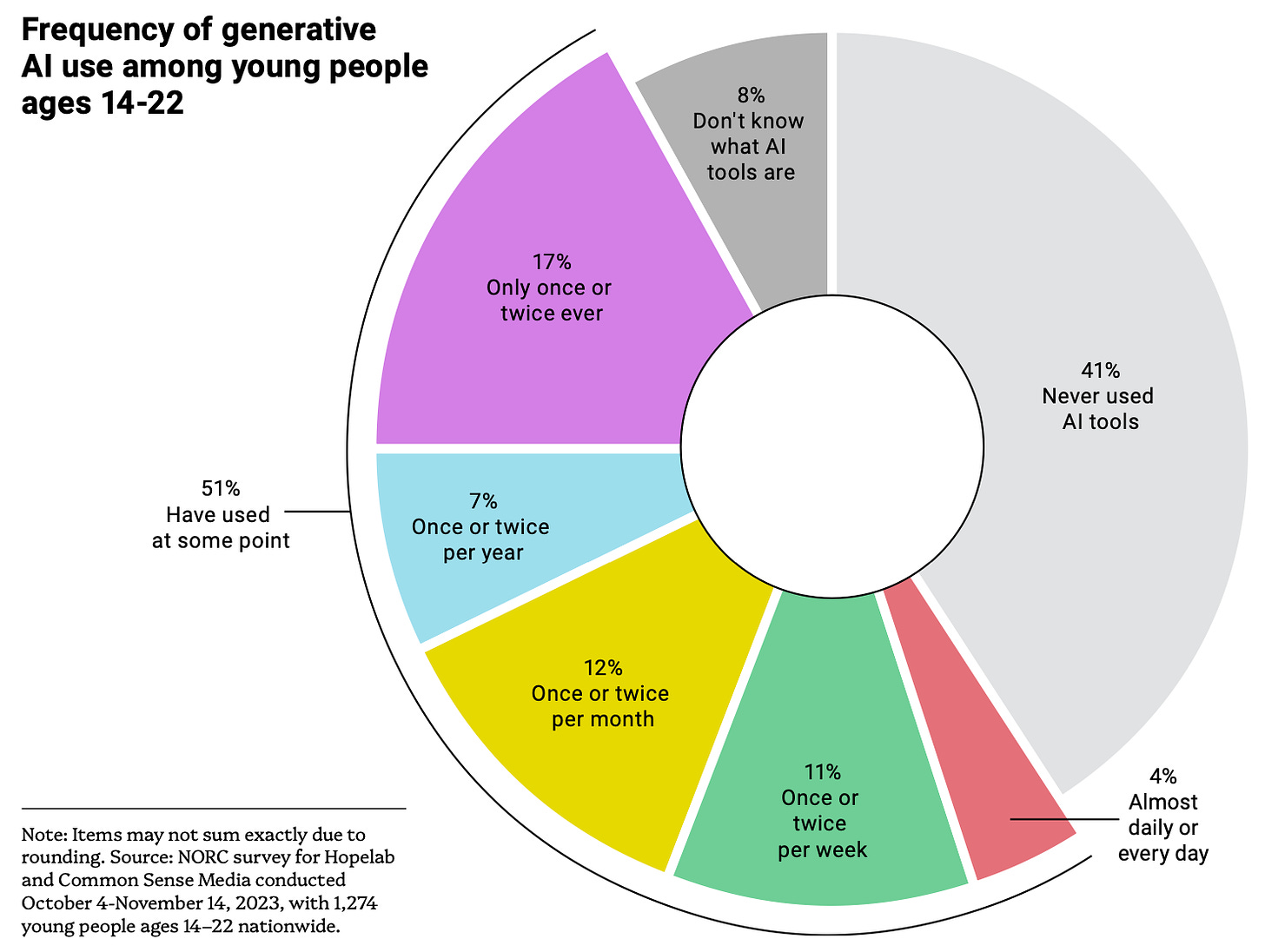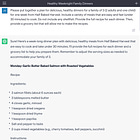Welcome to Techno Sapiens! I’m Jacqueline Nesi, a psychologist and professor at Brown University, co-founder of Tech Without Stress (@techwithoutstress), and mom of two young kids. Techno Sapiens is now home to almost 25,000 readers, and I’m so grateful you’re here.
Know someone who might want to join us? Share this post!
5 min read
I’m ever-so-slowly starting to integrate generative AI tools (like ChatGPT and Perplexity) into my everyday life. I’m using them for recipes, to answer questions, and for the occasional theme song, for example.12
But what about teens? Are they actually using these tools? And what do they think of them?
To date, we’ve had very little data to guide us on these questions.
Enter: a new research report from Hopelab, Harvard’s Center for Digital Thriving, and Common Sense Media. Researchers surveyed a nationally-representative sample of 1,274 U.S. young people (ages 14-22) to understand how they’re using generative AI, and the results are fascinating.
So, without further ado, let’s get to it. I’ll let ChatGPT kick us off.
Are young people actually using generative AI?
The survey defined “generative AI” as “a type of artificial intelligence (AI) system that can generate original images, sounds, and text—including artwork, music, and stories—in response to your prompts.” Examples were also given: ChatGPT, Snapchat’s “My AI,” and Photoshop AI.
A full 41% have never used AI, and 8% do not know even know what it is. That leaves 51% who have used AI, with about one-quarter (27%) using it regularly (at least once or twice a month).
What are they using it for?
Young people who use AI say they’re using it for a few different reasons.
The most commonly cited reasons are to get information (53%), brainstorm ideas (51%), and help with schoolwork (46%)
Interestingly, nearly one-third of AI users (31%) say they’ve used it to make pictures or images
Less common uses include: helping with their job (17%), making sounds or music (16%), and writing code (15%)
Notably, young Black and Latinx AI users were more likely to cite most of these reasons than were White AI users
Among youth who never use AI, one-third (34%) say that’s because they don’t think it would be helpful for them, and about one-quarter say it is associated with cheating or stealing others’ work (24%), that they don’t know how to use it (23%), or that they’re concerned about privacy (22%).
What do they think of it?
As with most new technologies, it’s a mixed bag! When asked whether generative AI would have a positive or negative impact on their lives in the next 10 years, the most popular answer (41%) was “both positive and negative.” 19% said it would be mostly negative, and 16% mostly positive.
Open-ended questions also asked young people what they were most excited about, and most concerned about, when it comes to AI.
Here’s what they said, along with some representative quotes.
Most exciting aspects of AI
Access to information, including to help with school and work. “I think it will revolutionize efficiency at school and in the workplace, freeing up workers for higher-level activities.”
An outlet for creativity. “Being able to see it evolve into making everyone more creative, and further increasing my generation’s imagination.”
Potential in science and medicine. “I’m excited about how it will help us advance as humans and how it will be used by STEM.”
Most concerning aspects of AI
Dwindling job prospects. “I think that it will outperform human tasks and there will be less jobs.”
Intellectual property theft. “I’m worried about it stealing art from artists.”
Spread misinformation. “People believing things that seem to be real but in reality, it is all AI and fake.”
Privacy concerns. “Privacy concerns about it being able to read all of our data.”
AI “taking over” (this was, apparently, the exact phrase used by many participants responding to this question). “AI might become too intelligent and conquer humans like a robot uprising.”3
What do teens think adults should know about AI?
Finally, in a separate survey of 1,545 teens (ages 13-17), researchers asked one last open-ended question: “What’s one thing adults should know about how teens use artificial intelligence (AI)?”
Here’s some of what they had to say.
They’re using AI for schoolwork, and (sometimes) for cheating. One teen: “[We use it] to chat on everything from writing term papers to figuring out answers to really hard assignments.” Another: “Not all kids use [it] to cheat in school.”
They’re using it to get their questions answered, including about sensitive subjects. “We ask [AI] questions they [adults] won’t answer” and “It helps me ask questions without feeling any pressure.”
They’re using it for companionship. “It can give you an outlet to talk about things you don’t want anyone else to know” and “That robot makes me feel important.”4
They’re using it for creative purposes (music, art). “We use it for very creative purposes, not just cheating on homework.”
They’re using it to change their appearances. “We can change who we are and become someone else that we want to become.”
They’re using it to bully others. “As a bullying tactic online when creating AI generated voices and images.”
They’re using it to experiment sexually. “I think some people want to use it in really sexual ways.”
They’re looking for adult guidance. “Adults need to research more about these new concepts and talk to their kids about it.”
All in favor of more data, s-AI
These results give us important initial insight into whether young people are using AI, how they’re using it, and what they think of it.
The fact that only 4% of teens are using these tools daily stands out. On the one hand, AI tools may not yet be as pervasive among young people as the tech-focused among us (including me) have believed. On the other hand, I wonder about young people’s awareness of the degree to which AI is already baked into the tools they’re already using—from Snapchat to Google.
Of course, this survey can’t provide any causal evidence. It can’t tell us definitively about how AI will shape teens’ lives, for better or worse. What it can give us, though, is a window into teen’s own perspectives on AI, their excitements and concerns, and a reminder that they need our support navigating it.
Alright ChatGPT, send us off…
A quick survey
What did you think of this week’s post? Your feedback helps me make this better. Thanks!
The Best | Great | Good | Meh | The Worst
Most recently, I used Perplexity to assist me in finding the aforementioned play mat for my newly army-crawling baby (and frequently-falling-off-things toddler). As always, I had highly specific requirements: very large, looks more like a rug than a mat, thick foam, doesn’t cost $500, etc. In case you’re also in the market: I went with this one. We love it! Note: purchase does not include the baby in the tiny crochet hat (!) pictured in the Amazon photo.
My husband uses ChatGPT regularly throughout the day. One recent successes was a pancake recipe that: (1) tasted great, and (2) helped him occupy the kids while I finished this newsletter one morning. A win!
In line with the “AI taking over” concern, the report notes that “Many young people also referenced movies about robots and AI, such as The Terminator, as a foreshadowing of what they fear might happen.”
Note that there are entire programs (like the chatbot service Character.ai) designed to fill this “companionship” role. One teen, who had spent many hours talking to a chatbot called “Psychologist,” told The Verge: “It’s not like a journal, where you’re talking to a brick wall…it really responds.”









I could say lots of things about AI but right now I'll stick to the first thought I had on reading this. Using Chat GPT or similar is hugely energy consuming in comparison to a basic search engine. If every time someone wants to answer a question or find a recipe they use AI rather than just using a search engine (or even opening a book!) then we're in trouble. For that reason, if nothing else, I'm glad that not all teenagers are reaching out for it on a daily basis.
If AI existed when I was in school you better believe I’d have used it to write all my papers! Insightful piece!